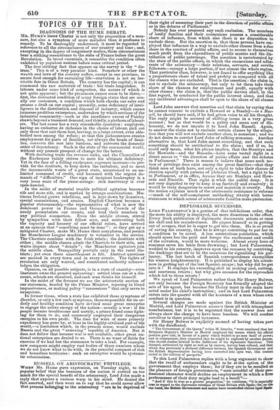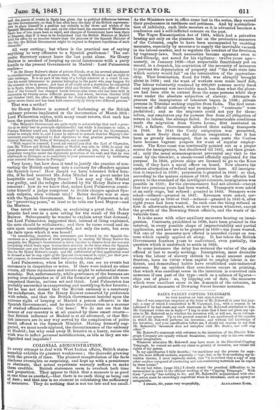DEPLORABLE SUCCESSES.
LORD PALMERSTON'S is a genius of that infelicitous order, that the more his ability is displayed, the more disastrous is the effect. Every fresh publication of diplomatic documents attests at once his skill and his maladroitness. He piques himself so in getting out of scrapes, that he is eager to get into them. He is so proud of saving his country, that he is always contriving to put her in a condition to be saved. A less ostentatious patriotism, which should spare her the peril and forego the excitement and credit of the salvation, would be more welcome. Almost every hero of romance saves his bride from drowning ; but Lord Palmerston, wedded to his country, improves upon the romance by contriving the duckings that are to be the occasions for signalizing his gal- lantry. The last batch of Spanish correspondence exemplifies his wanton knighterrantry. It is published to display his adroit- ness in getting out of the last Spanish scrape; but why did he get into it ? It displays his exceeding skill in making cool, cutting, and courteous retorts ; but why give occasion for the reproaches which led to those retorts 2
We speak of Lord Palmerston rather than Sir Henry Bulwer, not only because the Foreign Secretary has formally adopted the acts of his agent, but because Sir Henry must in the main have acted under his chief's instruction; and in fact Lord Palmerston enters into the quarrel with all the keenness of a man whose own • conduct is in question.
Several charges are made against the British Minister at Madrid, and Lord Palmerston answers them all with triumphant nonchalance; but it is to be regretted that the answer does not always show the charge to have been baseless. We will confine ourselves to three principal instances.
Sir Henry Bulwer is explicitly accused of having taken part with the disaffected.
"The Government of the Queen," writes M. Isturitz, "were convinced that her Britannic Majesty's Minister at Madrid employed the means which his official position gave him, in favour of a party which wished to po-sess itself of power; and in consequence, they requested that he might be replaced by another person, who should confine himself to the fulfilment of his diplomatic functions. This demand, authorized by right as well as by custom, having been refused, and that which was previously a declared difference between the Spanish Government and the British Representative having, been converted into open war, this contest ended in the delivery of passports.
To this Lord Palmerston replies with a long argument to show that the recall of ambassadors ought to be at the option of the government that employs them ; for if they are to be recalled at the pleasure of foreign governments, "men mindful of their pro- fessional character would decline an employment in which a firm performance of their duty might lead to a recall "-
"And And if this be true as a general proposition," he continues "it is especially true in regard to the diplomatic relation,, of Great Britain with 'pain; for, on the one hand, the British Government and nation have unsatisfied claims upon Spain
and the course of events in Spain has given rise to political differences between the two Governments; so that it has often been the duty of the British representa- tive to place himself in a position not suitable to the views and wishes of the Spanish .Ministers of the day; and, on the other hand, the succession of Ministers in spain has of late years been so rapid, and changes of Government have been there so frequent, that if it were to be understood that the British Minister at Madrid held his office by no steadier tenure than the pleasure of the Spanish Minister of the day, the Bntiab. Government might be exposed to frequent repetitions of such
demands."
All very cutting; but where is the practical use of saying anything so very ofensive to a Spanish gentleman ? The sar- castic Secretary cannot leave the last point alone. Sir Henry Bulwer is accused of keeping up social intercourse with- a party hostile to the present Government in Madrid : Lord Palmerston reflhies- It Sir Henry Bulvrer's choice of private friends, or at his avowed attachment to constitutional principles of government, the Spanish Ministers had no right to take umbrage. It is no part of the duty of a foreign minister at a court to con- fine his social intercourse to persons belonging to the party who may happen for the moment to be in power; and least of all could such a restriction be submitted to in Spain, where, between December 1832 and October 1847, the office of Presi- dent of the Council has changed hands twenty-nine times and has been held in succession by twenty-seven different persons, and where, between October 1832 and October 1847, the office of Minister for Foreign Affairs has changed hands thirty-seven times and has been held successively by thirty-two different persons."
That was a settler!
Sir Henry Bulwer is accused of harbouring at the British embassy persons implicated in the insurrection of March 26th: Lord Palmerston replies, with many smart retorts, that such has been the practice in Madrid— "Her Majesty's Government are quite ready to acknowledge that such a prac- tice is its itself and in principle objectionable; but while it continues to exist, a Foreign Minister could not, without discredit to himself and to his Government, refuse to comply with it; and I must be allowed to remark that her Majesty's Go- vernment scarcely expected to find objections to that practice proceeding from General Narvaez, the Duke of Sotomayor, and yourself.
"With regard to yourself, I need not remind you that the Earl of Clarendon, then Mr. Villiers and British Minister at Madrid, was able, in 1836, to enjoy the great pleasure and the heartfelt satisfaction of affording you when in danger, a temporary reception under the diplomatic protection of his roof; and that he was afterwards so fortunate as to contribute to your permanent safety by facilitating your removal from thence to Portugal."
. Very keen; but how does it tend to justify the practice of con- verting the British embassy into a sactuary for offenders against the Spanish laws? How should we have tolerated Seilor Istu- ritz, if he had received Mr. John Mitchel as a guest under his hospitable roof in Harley Street? You may say that Mitchel was guilty, and the refugee sheltered by Sir Henry Bulwer was innocent : how do we know that, unless Lord Palmerston consti- tutes himself a judge competent to decide charges against Spa- nish culprits, even without trial? Better declare war at once with the Spanish Government. But no • Lord Palmerston is all for "preserving peace," at least so he tells our Lord Mayor—and the Marines.
One retort is remarkable, as explaining a great deal. Seiior Isturitz had sent in a note asking for the recall of Sir Henry Bulwer. Subsequently he wanted to explain away that demand; but Lord Palmerston suggested that, instead of being explained, the note should be withdrawn ; and then he turns round and in- sists upon considering as cancelled, not only the note, but even the facts upon which it was based!
"In considering, therefore, the statements put forward by the Spanish Go- vernment as a justification of their proceeding in sending Sir Henry Bulwer his passports, her Majesty's Government is fairly entitled to dismiss from the account everything which bears upon transactions anterior to the time when the Spanish Government sent you the last instruction upon which you withdrew your applica- tion for Sir Henry Bulwer's recall; and the withdrawal of that application must Is deemed a bar to any right of the Spanish Government to refer, for their pre- sent puspose, to transactions which had previously taken place."
Lord Palmerston, when he thinks fit, can see no events but statements in despatches or notes. If there were indeed no other events, all these rejoinders and retorts might be substantial states- manship. But, unfortunately, while gentlemen of the bureaux are poring over despatches as if all the formulae of political life were comprised therein, nations act and think. Lord Palmerston has probably succeeded in exasperating and mortifying Sehor Isturitz ; but he has not denied that the British embassy is a sanctuary for malefactors, that Sir Henry Bulwer consorted by preference with rebels, and that the British Government insisted upon the extreme right of keeping at Madrid a person offensive to the Spanish Government ; and he made the declaration in a manner of studied offensiveness. Cui bono? We do not see that the honour of our country is at all exalted by these smart retorts— that British influence at Madrid is at all advanced, or that Bri- tish interests are in any way served by the complication of polite insult offered to the Spanish Minister. Having formerly sug-- gested, we must needs applaud, the discontinuance of the embassy at Madrid ; but why send away M. Isturitz in a hurry, unless the wish was to inflict personal mortifications, as idle as they are un- dignified and impolitic?



























 Previous page
Previous page